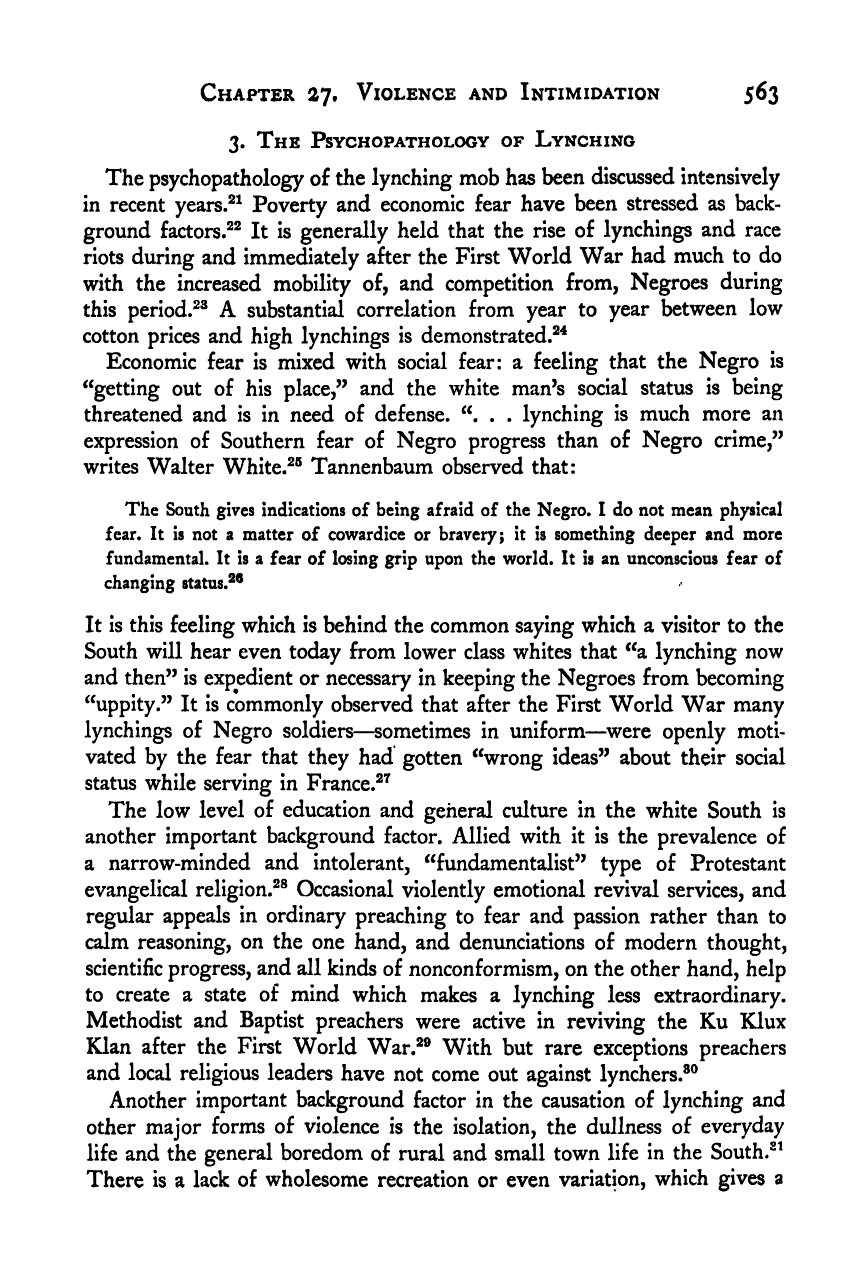Note: Gunnar Myrdal died in 1987, less than 70 years ago. Therefore, this work is protected by copyright, restricting your legal rights to reproduce it. However, you are welcome to view it on screen, as you do now. Read more about copyright.
Full resolution (TIFF) - On this page / på denna sida - VI. Justice - 27. Violence and Intimidation - 3. Tne Psychopathology of Lynching

<< prev. page << föreg. sida << >> nästa sida >> next page >>
Below is the raw OCR text
from the above scanned image.
Do you see an error? Proofread the page now!
Här nedan syns maskintolkade texten från faksimilbilden ovan.
Ser du något fel? Korrekturläs sidan nu!
This page has never been proofread. / Denna sida har aldrig korrekturlästs.
563
Chapter 27, Violence and Intimidation
3. The Psychopathology of Lynching
The psychopathology of the lynching mob has been discussed intensively
in recent years.^^ Poverty and economic fear have been stressed as back-
ground factors.^^ It is generally held that the rise of lynchings and race
riots during and immediately after the First World War had much to do
with the increased mobility of, and competition from, Negroes during
this period.^^ A substantial correlation from year to year between low
cotton prices and high lynchings is demonstrated.^^
Economic fear is mixed with social fear: a feeling that the Negro is
^^getting out of his place,” and the white man^s social status is being
threatened and is in need of defense. . . lynching is much more an
expression of Southern fear of Negro progress than of Negro crime,”
writes Walter White.^® Tannenbaum observed that:
The South gives indications of being afraid of the Negro. I do not mean physical
fear. It is not a matter of cowardice or bravery; it is something deeper and more
fundamental. It is a fear of losing grip upon the world. It is an unconscious fear of
changing status.^®
It is this feeling which is behind the common saying which a visitor to the
South will hear even today from lower class whites that ^^a lynching now
and then” is expedient or necessary in keeping the Negroes from becoming
^^uppity.” It is commonly observed that after the First World War many
lynchings of Negro soldiers—sometimes in uniform—were openly moti-
vated by the fear that they had gotten ‘^wrong ideas” about their social
status while serving in France.^^
The low level of education and general culture in the white South is
another important background factor. Allied with it is the prevalence of
a narrow-minded and intolerant, ^^fundamentalist” type of Protestant
evangelical religion.^® Occasional violently emotional revival services, and
regular appeals in ordinary preaching to fear and passion rather than to
calm reasoning, on the one hand, and denunciations of modern thought,
scientific progress, and all kinds of nonconformism, on the other hand, help
to create a state of mind which makes a lynching less extraordinary.
Methodist and Baptist preachers were active in reviving the Ku Klux
Klan after the First World War.^® With but rare exceptions preachers
and local religious leaders have not come out against lynchers.®®
Another important background factor in the causation of lynching and
other major forms of violence is the isolation, the dullness of everyday
life and the general boredom of rural and small town life in the South.®^
There is a lack of wholesome recreation or even variation, which gives a
<< prev. page << föreg. sida << >> nästa sida >> next page >>